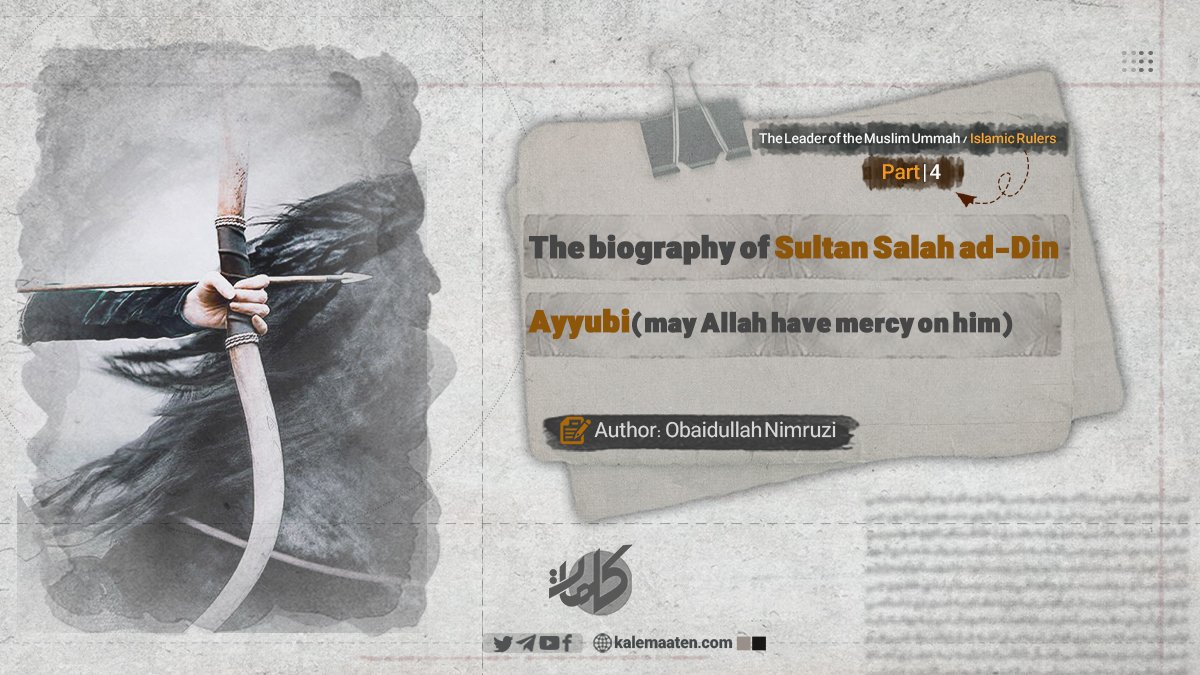
Author: Obaidullah Nimruzi
The Biography of Sultan Salah al-Din Ayyubi ‘May Allah have Mercy on Him’ (Part Four)
Characteristics and Attributes of Nur ad-Din
Islamic historians have provided valuable insights into the justice, piety, good governance, personal integrity, moral character, and passion for Jihad exhibited by Sultan Nur ad-Din. His name is synonymous with praise and respect among scholars and contemporaries alike. Ibn Jozi, a renowned historian, wrote in his famous work “Al-Muntazem”: “Nur ad-Din engaged in Jihad on the northern borders and liberated more than fifty cities from the infidels. His way of life surpassed that of most sultans and rulers, and the country’s roads were safe. He completely obeyed the caliphate in Baghdad and considered himself obliged to do so. Before his death, he canceled all taxes and illegal incomes. Simplicity and humility characterized his nature, and he held great regard for scholars and religious individuals.”
Ibn Khalakan, known for his historical prudence and research, remarked: “He (Sultan Nur ad-Din) was a man of fairness, asceticism, devotion, and piety—a ruler who adhered to Sharia. He had a great inclination toward good people and fought for the sake of Allah. He was diligent and active, generously giving donations and establishing many schools in major cities of Sham, making it difficult to collect comprehensive statistics of his merits and legacies.”
The famous historian Ibn Athir al-Jazri wrote about Sultan Nur ad-Din: “After studying the lives of past sultans and comparing them with those of the Righteous Caliphs and Umar bin Abdul Aziz, I have not observed anyone surpassing Nur ad-Din in character and justice.” Notably, Ibn Athir was fourteen years old at the time of Nur ad-Din’s death, which lends significant weight to his narrative and testimony. While describing the late sultan’s character, he added, “He used the income from the land he purchased with his share of the booty to support his living expenses.”
On one occasion, when his wife complained of their financial situation, he gave her three shops he owned in Homs for her expenses. The annual income from these shops was approximately twenty dinars. When she expressed that this amount was insufficient, he replied: “I have nothing more than this, and what I possess is all the property of Muslims. I am merely its treasurer, and I cannot jeopardize this trust for my comfort.”
Sultan Nur ad-Din was known for his extensive night prayers and dedicated time for Zikr (remembrance of Allah) and recitation. Although he was well-versed in Hanafi jurisprudence, he was not a fanatic. He studied hadith and taught it with the intention of earning reward. He obtained certificates and permission for his students to teach. His justice and fairness were so remarkable that he left no customs or tax collectors in his vast realm, closing all customs in Egypt, the Levant, the island, and Mosul. On the other hand, he observed Islamic Sharia with utmost respect and adhered strictly to its principles.
When someone filed a complaint against him before a judge, he decided to present himself in court but sent a message to the judge stating that he should not be treated with more respect than others. Ultimately, he won the case, but afterwards, he returned his rightful claim to the plaintiff, explaining that he had anticipated the outcome. He believed it was essential to appear in court to avoid any semblance of arrogance.
He established an independent court building for the judge to consistently address matters and respond to people’s petitions. Regardless of whether the complainant was a Jew, non-believer, or common citizen, he ensured that the oppressor was held accountable for their actions. His bravery was unparalleled; even if the individual challenging him was his own son, the highest commander of his army, or another ruler, he acted justly. In battle, he fought with two slings and two belts of ammunition. When someone advised him not to risk his life, saying that Islam would be left without a leader after him, he responded: “Who is Mahmoud (his first name) to be told this? Those who protected the country and Islam before me were the true guardians.”
He respected scholars and religious figures, standing in their presence and encouraging them to sit beside him. He spoke to them with complete humility and never disobeyed their religious orders. He wrote letters with his own hand; despite this humility, he commanded great awe and respect. It is a truth that this research cannot capture the full scope of his merits; many more studies are warranted to do justice to his legacy.
Continues…


